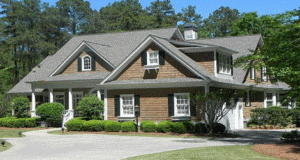What’s the best materials for Seamless rain gutters?
Seamless rain gutters are an essential part of any home’s roofing system. A well-designed and properly installed system can help protect the home from water damage and ensure that the roof remains in good condition for many years. The material used to make these gutters can have a major impact on their performance and durability. This article will explore the best materials for seamless rain gutters, and the advantages and disadvantages of each.
 Aluminum gutter
Aluminum gutter
Aluminum is one of the most common materials used for seamless rain gutters. Aluminum has a number of advantages. It is lightweight, strong, and corrosion-resistant, making it a great choice for areas with high levels of moisture or humidity. Aluminum gutters are also relatively inexpensive and easy to install, making them a popular choice for many homeowners. The main disadvantage of aluminum is that it is not as durable as some other materials and can be prone to denting or warping over time.
Steel gutter
Steel gutter is another material that is often used for seamless rain gutters. It is relatively inexpensive, lightweight, and easy to install. Steel gutters are also resistant to corrosion and can last for many years with proper maintenance. The main downside of vinyl is that it is not as strong as some other materials and can be prone to sagging or warping over time.
Copper Gutter
Copper Gutter is another popular material for seamless rain gutters. Copper is more expensive than other materials, but it is also extremely durable and can last for many years with proper maintenance. Copper gutters are also aesthetically pleasing and can add a touch of elegance to any home. The main downside of copper is that it is susceptible to corrosion, especially if it is not properly sealed or treated.
Steel gutters
Steel is another material that can be used for seamless rain gutters. Steel gutters are strong, durable, and relatively inexpensive, making it a good choice for many homeowners. It is also resistant to corrosion and can last for many years with proper maintenance. The main downside of steel is that it is prone to rusting over time, and it can be difficult to install.
seamless rain gutters
Fiberglass is another material that is often used for seamless gutters. Fiberglass is lightweight, strong, and resistant to corrosion, making it a great choice for many homes. The main disadvantage of fiberglass is that it is not as durable as some other materials and can be prone to cracking or warping over time.
seamless rain gutters
These are some of the most popular materials used for seamless rain gutters. Each has its own advantages and disadvantages, and it is important to consider all of them before making a decision. Ultimately, the best material for seamless rain gutters will depend on the individual needs and preferences of the homeowner.
OUR SERVICES
Your Neighborhood Gutter Contractor
Get more information concerning our service, do not wait to call us at 720 346 ROOF today. We’ll be more than happy to schedule a meeting with you.
Residential Gutter Contractor
Ernie’s Gutter specializes in residential gutter installation in Denver and has a team of experienced professional gutter installers available to get the job done right The First Time. From minor repairs and maintenance to full–scale gutter replacements.

Commercial Gutter
Commercial gutter needs with ease. Our seamless gutters are made using only the highest quality materials and are built to last. With our custom fit, your new gutters will fit your project perfectly and look great!. Call us at 720 346 ROOF and book a consultation today.

Gutter Guards
Gutter guards come in a variety of materials, sizes, and colors so you can customize them to fit your home’s aesthetic. Gutter guards are designed to help keep the leaves from entering your gutters Hail Claim Help

Downspouts and Extensions
Downspout for Drainage is the place to go for all your system needs.We understand the importance of properly managing water runoff and are committed to ensuring that your home or business is protected from potential flooding or water damage.

Gutter Repair
When it comes to Gutter Repair, it can be difficult to determine whether the damage was caused by hail or wind or age. While all types of damage can cause similar symptoms, they have different causes and require different repair methods.




0 Comments